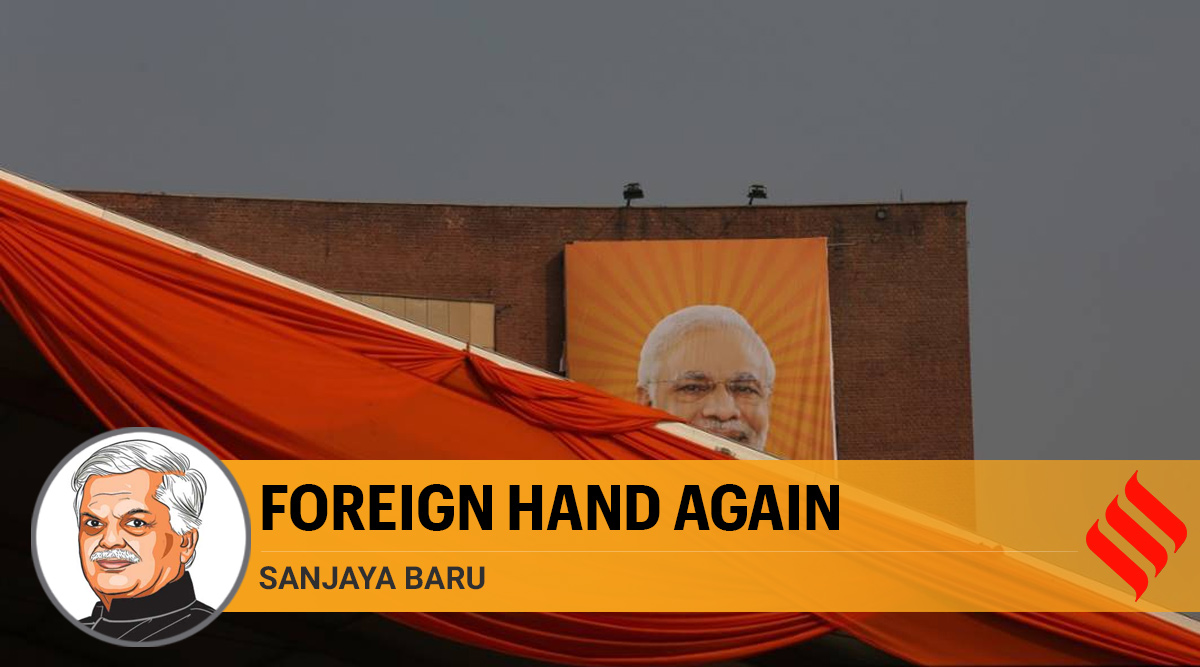
The “foreign hand” is back. None less than the Prime Minister has said that an international conspiracy is afoot. Everything from Hindutva to Indian tea is under attack. Of course, India’s enemies will always fish in troubled waters. But to point fingers at singers and tea-drinkers and, like in McCarthy’s America of the 1950s, look for “reds under beds” makes a mockery of national interest. No one should and would pooh-pooh genuine concerns about threats to national security, to India’s unity and integrity and to the life of its leaders. The question to ask is: What have we been doing at home to energise “foreign hands”?
Not long ago, an earlier Prime Minister assured the nation that the world wants India to do well. Addressing the annual India Today conclave in February 2005, PM Manmohan Singh said: “I submit to you for your consideration the idea that the global environment has never been more conducive for India’s economic development than it is today. The world wants India to do well. However, we recognise that our real challenges are at home.” What has happened since then that conspiratorial theories are being purveyed once again?
The foreign hand keeps making its appearance every now and then in domestic political discourse, sometimes with good reason but often due to the travails of national leaders. It gained in reputation in the pre-Emergency 1970s. The death of President Salvador Allende of Chile in September 1973, following a military coup staged with the help of the CIA, triggered concern in New Delhi that the CIA was also preparing to oust PM Indira Gandhi. People close to Indira Gandhi have long believed that Allende’s death played its part in creating a sense of insecurity in the Prime Minister.
The Soviet intelligence agency, KGB, time and again warned Indira Gandhi of attempts to depose her in the manner of Iran’s Mohammed Mossadegh, Congo’s Patrice Lumumba, Chile’s Allende and many other world leaders regarded as inimical to American interests during the Cold War. The Soviet hand, in turn, was also meddling around the world helping friends and deposing enemies. The Cold War was like that.
Organisations ranging from Ananda Marg and the RSS on the political right to the Maoists on the left were accused of being pawns in foreign hands. Even a leader like Jayaprakash Narayan was accused of being sponsored by the CIA. In the early 1980s, a senior US diplomat, Jeanne Kirkpatrick, then US ambassador to the United Nations, a political scientist and a rightwing politician close to President Ronald Reagan, was accused of plotting the “balkanisation” of unfriendly, pro-Soviet India. Rejecting such speculation, US government spokespersons accused the KGB of planting such stories in the Indian media.
By 1990, author V S Naipaul turned the mirror inward and wrote about the “million mutinies” within that hobbled India’s functioning. Living through wars, droughts, poor economic performance, Naxalism, caste and communal conflict, India’s political leaders preferred to point to the foreign hand rather than domestic politics. However, it is entirely possible that well into the 1980s, through the Cold War era, foreign powers hoped to gain influence in India. Combine this with India’s own domestic challenges and it is easy to see why a powerful leader like Indira Gandhi felt so insecure. In the end, she and her elder son were killed by forces inimical to India.
The Nineties changed the game. The end of the Cold War gave India some breathing space. Prime Minister P V Narasimha Rao adopted an economic and foreign policy that expanded that space and infused confidence into what was then a “New India”, but one imbued with greater self-confidence and resolve. As economic growth accelerated, business opportunities expanded in an increasingly open market and India built bridges with countries ranging from the US to Germany, Japan and Singapore, the outside world was viewed more benignly. The information technology and software services boom created a world of opportunity for the Indian middle class. Then came the Shakti nuclear tests and India’s ability to withstand external economic sanctions.
India entered the 21st century as an even more confident power. The only foreign hand it worried about was Pakistan-sponsored terrorism. But then, the whole world was with India in worrying about it. The secular rise in India’s economic growth, its embrace of globalisation and the new strategic partnership with the US injected confidence into a rising India. It was against that background, of accelerated economic growth and growing global interest in India’s rise, that PM Manmohan Singh assured us that the world wants India to do well. We are now being told that the global environment is no longer as conducive.
But the West and most of Asia want India to do well even more today than before, given China’s rise and assertiveness. The world wants India to emerge as another engine of global growth and to be able to balance China’s power. Political leaders can still point to the “foreign hand” — Pakistan, with some evidence, and to China. There are always local causes that get external support — from Maoists to Khalistanis, Islamic radicals to Christian evangelists and, why not, Hindu extremists. But the kind of “foreign hand” that Indira Gandhi worried about is not the real threat to India’s growth and security.
Yet, domestic politics needs a “foreign hand” every now and then. The problems of unemployment, poverty, inequality, caste and communal tensions and all the other challenges India faces have not gone away. A “million mutinies” are afoot. But how dare we say these are “Made in India”? Behold the foreign hand!
This article first appeared in the print edition on February 9, 2021, under the title “Foreign hand again”. The writer is former media advisor to Prime Minister of India



